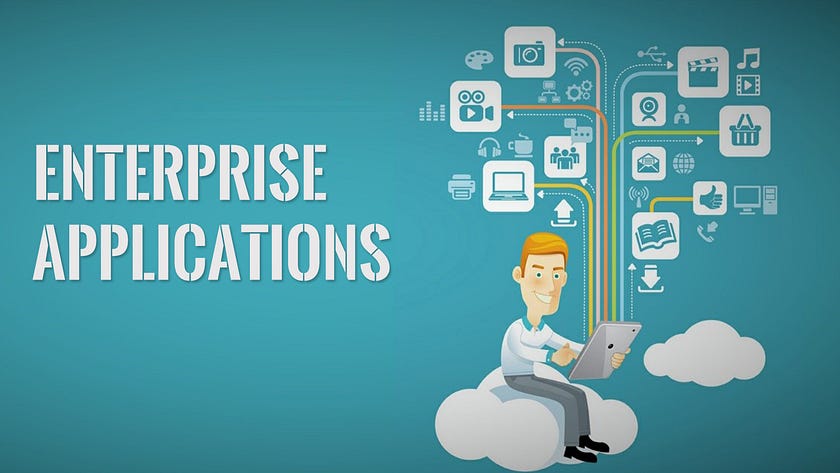What Are Enterprise Applications? Definition, Examples & Use Cases in 2024

In today’s digital landscape, businesses of all sizes are increasingly relying on technology to streamline operations, enhance productivity, and maintain a competitive edge. Central to this technological shift is the use of enterprise applications — sophisticated software solutions designed to support and optimize various business functions. But what exactly are enterprise applications, and how are they being used in 2024? Let’s delve into the definition, examples, and key use cases of these powerful tools.
What Are Enterprise Applications?
Enterprise applications (EAs) are large-scale software systems specifically designed to operate in a corporate environment. These applications are robust, scalable, and integrate seamlessly with an organization’s existing infrastructure. Their primary function is to solve business problems, facilitate complex processes, and provide actionable insights through data management and analytics. Unlike consumer applications, which are intended for individual use, enterprise applications cater to multiple users and departments, ensuring that everyone within the organization can collaborate efficiently and access real-time information.
Key Characteristics of Enterprise Applications
- Scalability: Enterprise applications are designed to handle a growing amount of work and can scale up or down based on the organization’s needs.
- Integration: These applications typically integrate with other systems within the organization, such as CRM (Customer Relationship Management), ERP (Enterprise Resource Planning), and SCM (Supply Chain Management) systems, providing a unified platform for business operations.
- Customizability: Enterprise applications can be tailored to meet the specific needs of a business, accommodating unique workflows and processes.
- Security: Given the sensitive nature of the data managed by these applications, they include robust security measures to protect against unauthorized access and cyber threats.
- User Management: They support multi-user environments, with features that enable role-based access control and user management.
Examples of Enterprise Applications
- ERP (Enterprise Resource Planning) Systems: ERP systems are among the most commonly used enterprise applications. They integrate various business processes — such as finance, HR, manufacturing, and supply chain — into a single system, providing a holistic view of the organization’s operations. Popular ERP solutions include SAP, Oracle ERP Cloud, and Microsoft Dynamics 365.
- CRM (Customer Relationship Management) Systems: CRM systems help businesses manage customer interactions, sales processes, and marketing campaigns. They centralize customer data, enabling organizations to improve customer service and target their marketing efforts more effectively. Salesforce and HubSpot are leading CRM platforms.
- Supply Chain Management (SCM) Systems: SCM systems optimize the flow of goods, information, and finances across the supply chain. They enable companies to manage everything from procurement and production to logistics and inventory. Notable SCM solutions include Oracle SCM Cloud and SAP Integrated Business Planning.
- Human Capital Management (HCM) Systems: HCM systems manage various HR functions, including recruitment, payroll, performance management, and employee development. Workday and SAP SuccessFactors are widely used HCM platforms.
- Business Intelligence (BI) Tools: BI tools are enterprise applications that analyze data to help businesses make informed decisions. They convert raw data into meaningful insights through dashboards, reports, and visualizations. Popular BI tools include Tableau, Power BI, and Looker.
Use Cases of Enterprise Applications in 2024
- Enhanced Data-Driven Decision Making: In 2024, businesses are increasingly leveraging enterprise applications for data-driven decision-making. BI tools, in particular, are being used to analyze large datasets and generate actionable insights, helping organizations identify trends, forecast demand, and optimize operations.
- Streamlined Remote Work: As remote work continues to be a prevalent trend, enterprise applications play a crucial role in facilitating collaboration and communication among distributed teams. Cloud-based CRM and ERP systems enable employees to access critical business information from anywhere, ensuring that work continues seamlessly regardless of location.
- Improved Customer Experience: CRM systems are helping businesses enhance customer experience by providing a 360-degree view of customer interactions. This enables companies to personalize their services, respond to customer inquiries faster, and build stronger customer relationships.
- Supply Chain Resilience: In response to ongoing global disruptions, organizations are using SCM systems to build more resilient supply chains. These applications help companies anticipate potential supply chain issues, manage inventory levels, and ensure timely delivery of products.
- Automation of Routine Tasks: Enterprise applications are increasingly being used to automate routine tasks, freeing up employees to focus on more strategic activities. For example, ERP systems can automate financial reporting and invoicing, while HCM systems can handle payroll processing and employee onboarding.
Conclusion
Enterprise applications are indispensable tools for modern businesses, offering the scalability, integration, and security needed to manage complex operations. In 2024, these applications are driving innovation across industries, enabling organizations to make data-driven decisions, enhance customer experience, and build resilient, efficient operations. As technology continues to evolve, enterprise applications will remain at the forefront of business transformation, helping companies navigate the challenges and opportunities of the digital age.


Comments
Post a Comment